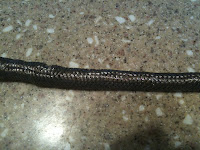After a somewhat turbulent brew day yesterday, I have a beer that is bubbling away this morning.
I encountered a few snags along the way. First was the stuck or pinched filter in my mash tun. Once I opened up the filter the wort was flowing quite nicely. It may have been assisted by the high volume and temperature which increased the overall wort viscosity. Once the filter was corrected, the wort start to flow freely.
While chilling, the exit hose from the copper chiller come loose from the fitting. I then had to turn off the water and reattach the hose back to the fitting and then hook it all back up. Once that was fixed, the temperature of the beer dropped pretty quickly. It seems that the water temperatures from our city water are dropping with the shorter days and cooler temperatures. I managed to cool the wort to about 68 degrees. This was well within the range for pitching the yeast.
The recipe I brewed yesterday, originated from this Northern Brewer recipe. The recipe was tailored to a brew house efficiency of 80%.

Mash Water (All City Water)
Total grain (lbs) : 8
Target Mash Water Volume: 2.5 gallons
Final Mash Water Volume: 3.75 gallons
Sparge Volume: 4 gallons
Mash Temperature: 152 degrees
Grain Ingredients
 7 lbs Marris Otter (Pale Malt)
7 lbs Marris Otter (Pale Malt)0.5 lb Carafa III
0.5 lb Chocolate Malt
Boil Additions
0.7 lb Milk Sugar (Lactose)
1 oz Willamette (hops)
Total Wort to Kettle: ~6.25 gallons
Total Wort to Fermenter: ~5+ gallons
Here are the original gravity (OG) and final gravity (FG) readings according to BeerSmith v1.4 and measurments.
OG estimated : 1.053
OG for style: 1.044 - 1.060
OG actual: 1.056
Actual brew house efficiency: 85%
FG estimated: 1.014
FG for style: 1.012 - 1.024
FG actual : TBD
If the FG comes in at 1.014 as estimated, this beer should have about 5.48% alcohol. Not a very big beer, but still comes in above a session beer. I anticipate it will be a very tasty beer. I hope to introduce the milk stout for the first time to several people and spark some intrigue in this beer and style.
Thank you for reading along.
- Matt
Please follow any of the references throughout this series of posts for definitions to the terms and information that went into this brew.
- pitching the yeast - http://www.homebrewtalk.com/wiki/index.php/Pitching_the_Yeast
- session beer - http://beeradvocate.com/articles/653
- wort - https://www.google.com/search?q=define+wort
- Sweet Stout Journal - Mash @7brewingco - http://mhorner.blogspot.com/2012/09/sweet-stout-journal-mash-7brewingco.html
- Sweet Stout Journal - Post Mash @7brewingco - http://mhorner.blogspot.com/2012/09/sweet-stout-journal-post-mash-7brewingco.html
- Brewing with Denny - http://hbd.org/cascade/dennybrew/
- BeerSmith.com - http://beersmith.com/
- BeerSmith.com Podcast # 39 - http://beersmith.com/blog/2012/05/31/advanced-home-brewing-with-gordon-strong-beersmith-podcast-39/
- Original Sweet Stout recipe from Northern Brewer - http://www.northernbrewer.com/documentation/allgrain/AG-SweetStout.pdf
- Wynkoop Brewing Company - http://www.wynkoop.com/








